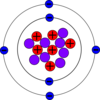carbon-14

Has synonym(s): radioactive carbon
Definition: Carbon-14, C-14, 14C or radiocarbon, is a radioactive isotope of carbon with an atomic nucleus containing 6 protons and 8 neutrons. Its presence in organic materials is the basis of the radiocarbon dating method pioneered by Willard Libby and colleagues (1949) to date archaeological, geological and hydrogeological samples. Carbon-14 was discovered on February 27, 1940, by Martin Kamen and Sam Ruben at the University of California Radiation Laboratory in Berkeley, California. Its existence had been suggested by Franz Kurie in 1934.There are three naturally occurring isotopes of carbon on Earth: carbon-12 (12C), which makes up 99% of all carbon on Earth; carbon-13 (13C), which makes up 1%; and carbon-14 (14C), which occurs in trace amounts, making up about 1 or 1.5 atoms per 1012 atoms of carbon in the atmosphere. Carbon-12 and carbon-13 are both stable, while carbon-14 is unstable and has a half-life of 5700±30 years. Carbon-14 has a maximum specific activity of 62.5 mCi/mmol (2.31 GBq/mmol), or 164.9 GBq/g. Carbon-14 decays into nitrogen-14 (14N) through beta decay. A gram of carbon containing 1 atom of carbon-14 per 1012 atoms will emit ~0.2 beta particles per second. The primary natural source of carbon-14 on Earth is cosmic ray action on nitrogen in the atmosphere, and it is therefore a cosmogenic nuclide. However, open-air nuclear testing between 1955 and 1980 contributed to this pool.
Source: Wikipedia
Wikipedia Page (Something wrong with this association? Let us know.)
Wikidata Page (Something wrong with this association? Let us know.)


